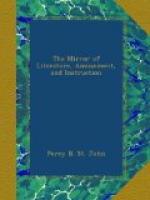* * * * *
Etruscan Vases.—The art of making earthenware was transported from Etruria into Greece. The Romans also borrowed this invention from the Etruscans, to whom also Greece was indebted for many of its ceremonies and religious institutions, as well as for its mechanics and artificers.
* * * * *
It is customary in the canton Wallis, Switzerland, for those who have found anything lost, even money, to affix it to a large crucifix in the churchyard, and there is not an example on record, of any object being taken away except by the rightful owner. W.G.C.
* * * * *
Cumberland Titles.—The honorary titles arising from the different degrees of allowed consequence or property in Cumberland, appear (says Britton) singular when compared with their usual acceptation in society. The mistress of the house is a Dame; every owner of a little landed property is a ’Statesman; his eldest son is the Laird; and where there is no son, the eldest daughter is born to the title of Leady. Thus we may see a ’Statesman driving the plough, a Lord attending the market with vegetables, and a Leady labouring at the churn. P.T.W.
* * * * *
A string of echo puns surpassing all others, may be seen in a scarce work, published in the reign of James I. A specimen—a divine, willing to play more with words, than to be serious in the expounding of his text, spoke thus in one part of the sermon:—“This dyall shewes we must die all; yet, notwithstanding, all howses are turned into ale-houses; our cares are turned into cates; our paradise, into, a pair of dice; our marriage, into a merry age; our matrimony, into a matter of money; our divines, into dry vines. It was not so in the days of Noah, Ah no!”—T.G.
* * * * *
Advertisement Extraordinary, from a Newspaper of 1796.—“Whereas the right hon. William Pitt, Chancellor of his Majesty’s Exchequer, did on the night of Monday last, and on or about the hour of six o’clock, utter in his place in the House of Commons, certain sentences or phrases, containing several assurances, denials, promises, retractions, persuasions, explanations, hints, insinuations, and intimations, and expressing much hope, fear, joy, sorrow, confidence, and doubt, upon the subject of peace, then and there recommended by Charles Grey, esq., member of the aforesaid House of Commons, for the county of Northumberland; and whereas the entire effectual and certain meaning of the whole of the said sentences, phrases, denials, promises, retractions, persuasions, explanations, hints, insinuations, and intimations, has escaped and fled, so that what remains is to plain understandings incomprehensible, and to many good men is matter of painful contemplation: now this is to promise to any person who shall restore the said lost meaning, or shall illustrate, simplify, and explain the said meaning, the sum of five thousand pounds, to be paid on the first day of April next, at the office of John Bull, esq., Pay-All and Fight-All, to the several high contracting powers, engaged in the present just and necessary war!




